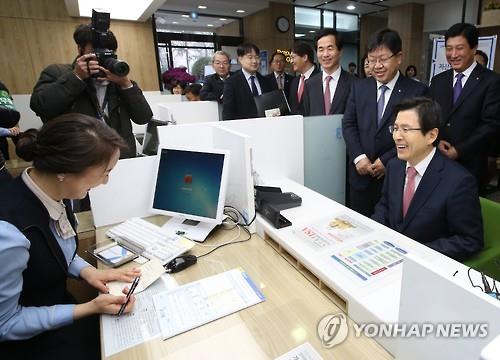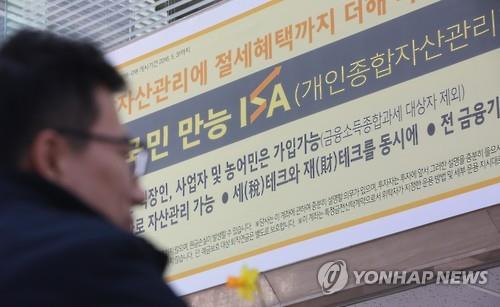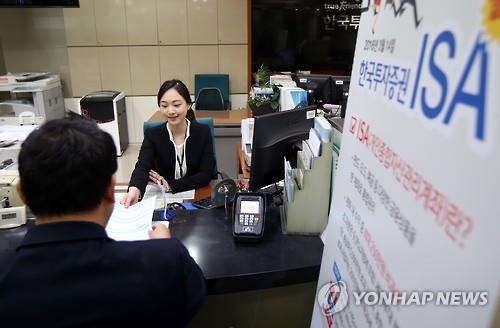- California Assembly OKs highest minimum wage in nation
- S. Korea unveils first graphic cigarette warnings
- US joins with South Korea, Japan in bid to deter North Korea
- LPGA golfer Chun In-gee finally back in action
- S. Korea won’t be top seed in final World Cup qualification round
- US men’s soccer misses 2nd straight Olympics
- US back on track in qualifying with 4-0 win over Guatemala
- High-intensity workout injuries spawn cottage industry
- CDC expands range of Zika mosquitoes into parts of Northeast
- Who knew? ‘The Walking Dead’ is helping families connect
Banks, brokerages in battle for bigger share in ISA market
SEOUL, (Yonhap) — Competition among South Korean banks and brokerages is heating up to sell new individual savings account (ISA) products, with some banks offering cash gifts or preferential interest rates well above the market average to woo more customers, industry watchers and officials said Wednesday.
The government-sponsored ISA scheme is designed to allow customers seeking higher returns amid record-low interest rates to manage diverse financial products in a single account. The ISA product offers some tax exemptions on financial gains for up to five years, according to the Financial Services Commission (FSC).
To attract customers, banks have budgeted a sizable amount of money for promotional events, and brokerages are offering products with an interest rate of up to 7 percent.
KB Kookmin Bank has spent about 550 million won (US$476,000) in the form of cash gifts to sell as many ISAs as possible in the past three weeks. KEB Hana Bank, which plans to compete with domestic rivals such as Shinhan Bank, KB Kookmin, Woori Bank and Industrial Bank of Korea by launching an ISA in June, has earmarked about 500 million won for similar purposes.
A total of 33 financial firms, including the four banks, began to introduce ISAs on March 14.
But some experts warn that some ISA products may not be as profitable as expected due to the hefty burdens of commissions charged by the financial institutions, let alone their management compensation.

Prime Minister Hwang Kyo-ahn opens an ISA at a Nonghyup Bank branch in Daejeon, central South Korea, on March 14, 2016.
For instance, a local brokerage’s high-risk, fund-type ISA product that consists of stock, bond, overseas stock and overseas bond funds has a basic commission set at 0.8 percent. Including its sale and management compensation, however, the clients may have to pay up to 2 percent of their investment in commissions annually.
Acknowledging overheated competition among lenders over ISAs, FSC Chairman Yim Jong-yong said Wednesday the government will closely monitor the market to prevent any distortions or damages resulting from the new product. The government analyzed a similar system in Britain to launch the ISA here.
“While allowing financial institutions to compete for profits, we will crack down on any incomplete sales of the product through ‘mystery shopping’ in which undercover officials will visit bank and brokerage outlets to see if they give customers a full explanation about their ISAs,” Yim said during a monthly briefing on the government’s ongoing financial reforms.
The Financial Supervisory Service said Wednesday that undercover field visits to the outlets will last until the end of June.

In this file photo taken on March 30, 2016, a man passes by the headquarters building of KB Kookmin Bank in Yeouido, Seoul, in front of a billboard promoting the new ISA product on its wall.
As of April 4, more than 1.25 million people have opted for ISAs since March 14 when the tax-efficient product debuted in the market. The value of the accounts sold reached 736.2 billion won, or 590,000 won per person, the FSC data showed.
During the cited period, banks accounted for more than 60 percent of the total value, with the remainder held by securities companies.
Two kinds of ISA products will be available from April 11, the FSC said.
The first ISA launched last month allowed customers to form a portfolio with their own selection of financial products. In the other to be launched on Monday, however, financial companies recommend a selection of products to customers.
Customers can inject up to 20 million won a year in cash deposits, funds and other investment products that form an ISA. Customers can earn up to 2 million won a year in interest income from the account tax free. The tax rate for interest gains exceeding 2 million won is 9.9 percent, far lower than the regular rate of 15.4 percent for normal income.
Experts largely welcomed the launch of ISAs, as they could absorb some of the market’s floating liquidity that is reaching 1,000 trillion won. But they warned that high-wealth customers will be the main beneficiaries of the new product.













Pingback: Stock Market Annual Rate Of Return History | Great Stock Market Futures